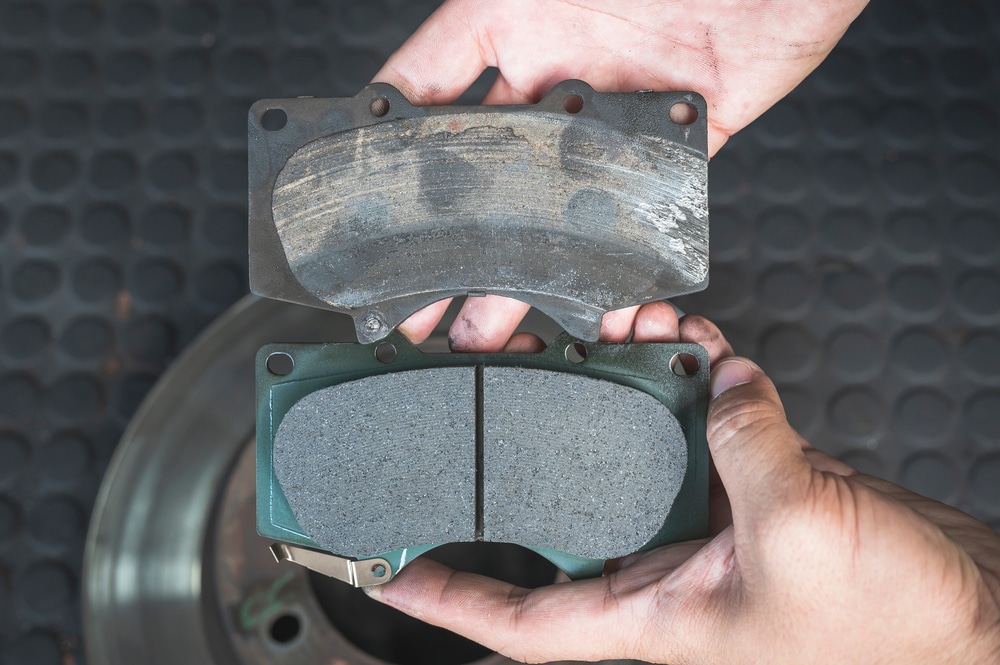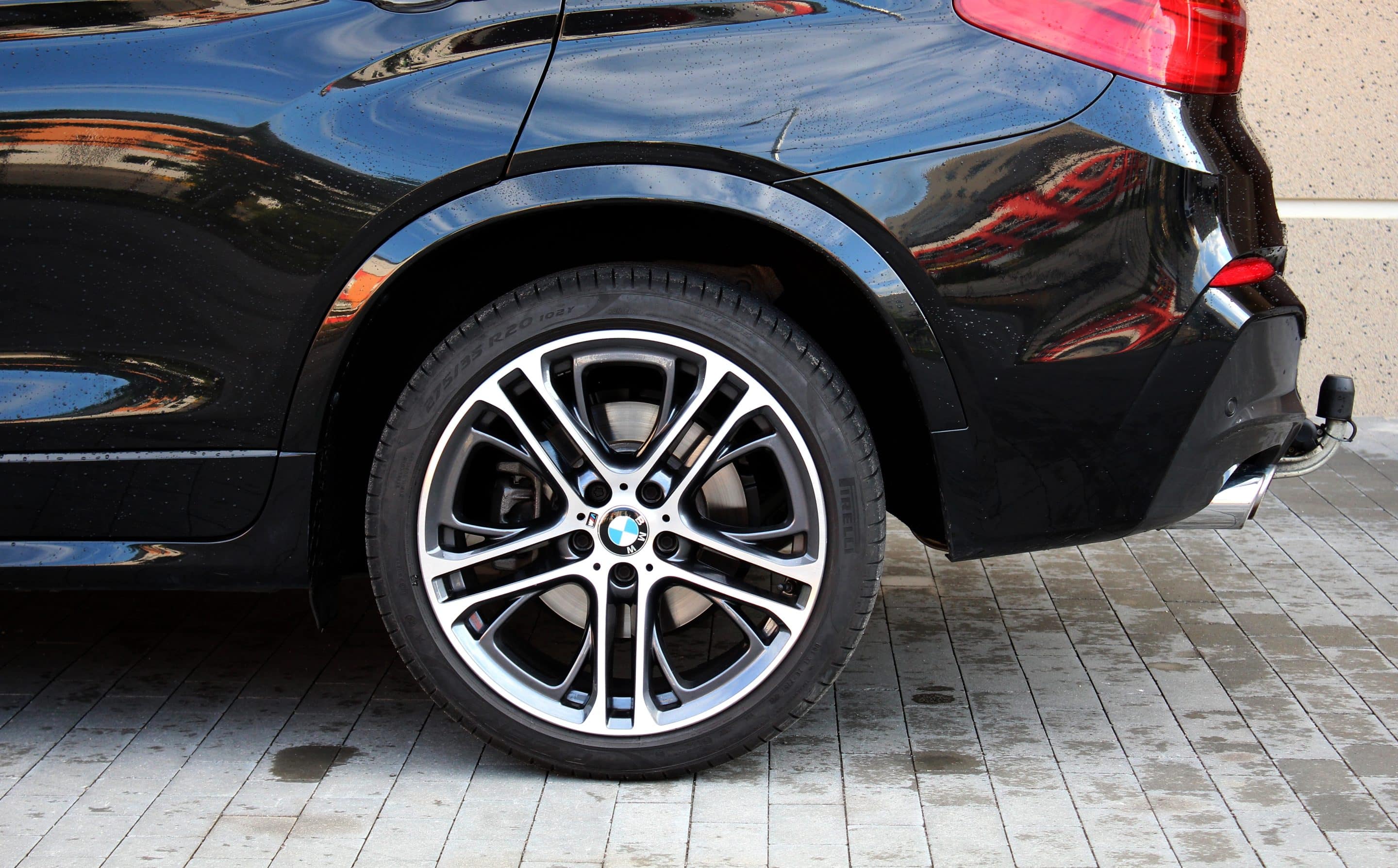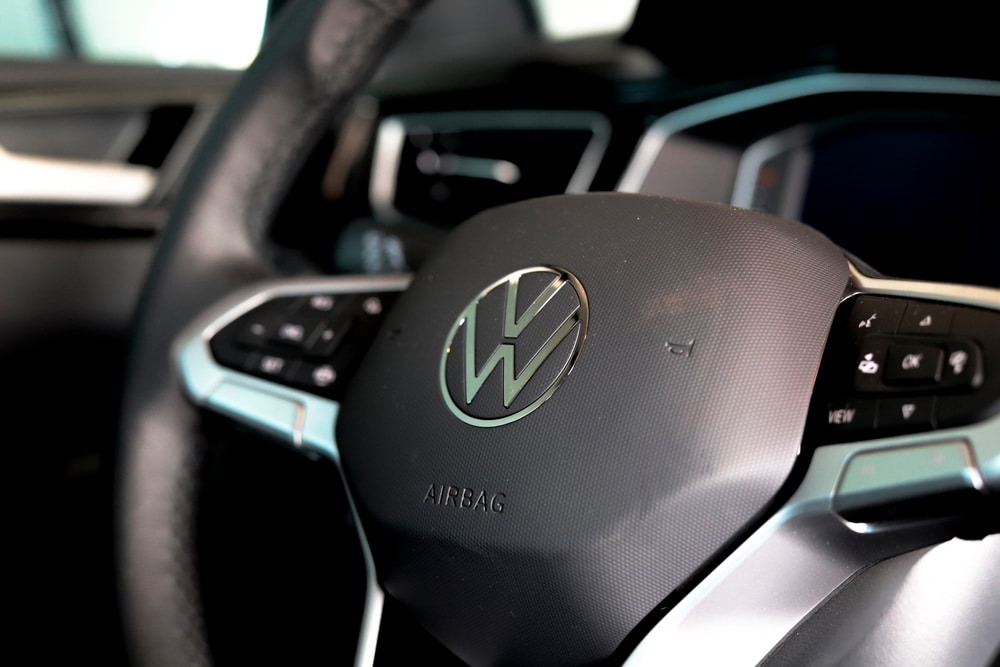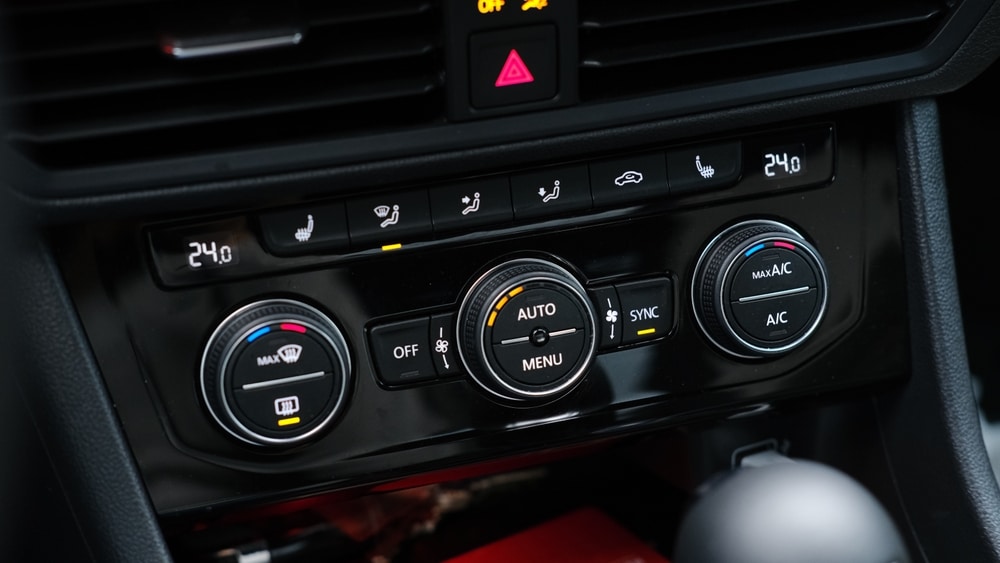Brake Pads
Brake pads are one of the most frequently replaced components on your vehicle, yet most drivers rarely think about them. That is, until the braking feels off, a warning light appears, or a screeching sound interrupts the drive.
This guide is here to change that.
At JDK Automotive, we’ve inspected and replaced thousands of brake pads over the years. From light wear to severe cases that have damaged discs or callipers, we’ve seen exactly what happens when brake pad wear is left too long. Using that experience, we’ve created a straightforward guide to help you understand how brake pads work, why they matter, and how to recognise the warning signs early.
If you’re based in Camberley, Farnborough, or the surrounding area and want expert, local advice, you’re in the right place.
Let’s start with the fundamentals: what exactly do your brake pads do?
How Brake Pads Actually Do Their Job
Let’s get right to it — brake pads are your vehicle’s frontline when it comes to safe stopping. Positioned inside the brake calliper, they press against the brake discs every time you step on the pedal. (Note: some cars use brake shoes and drums instead of pads and discs.)
These relatively small components play a big role. When you apply the brakes, hydraulic pressure forces the pads onto the rotating brake disc, generating the friction required to slow the car down. That friction also creates heat — a lot of it. Brake pads are engineered to manage that heat safely, but wear is built into the system.
Every time you brake, a fraction of the pad material is lost. That’s not a fault — it’s by design. But as the material wears away over time, braking performance can start to drop. If ignored, it can even lead to damage to other parts of the system, including the discs. That’s when what should be a simple brake pad change becomes a more costly repair.
At JDK Automotive in Camberley, we check your brake pads during every service. We’ll measure the wear and let you know if they’re close to their limit, because when it comes to braking, there’s no room for uncertainty.
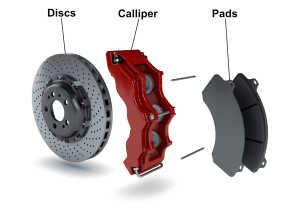
How Brake Pads Actually Do Their Job
Let’s get right to it: brake pads are your vehicle’s frontline when it comes to safe stopping. Positioned inside the brake calliper, they press against the brake discs every time you step on the pedal. (Note: some cars use brake shoes and drums instead of pads and discs.)
These relatively small components play a big role. When you apply the brakes, hydraulic pressure forces the pads onto the rotating brake disc, generating the friction required to slow the car down. That friction also creates heat. A lot of it. Brake pads are engineered to manage that heat safely, but wear is built into the system.
Every time you brake, a fraction of the pad material is lost. That’s not a fault. It’s by design. But as the material wears away over time, braking performance can start to drop. If ignored, it can even lead to damage to other parts of the system, including the discs. That’s when what should be a simple brake pad change becomes a more costly repair.
At JDK Automotive in Camberley, we check your brake pads during every service. We’ll measure the wear and let you know if they’re close to their limit. Because when it comes to braking, there’s no room for uncertainty.
Why Not All Brake Pads Are the Same
Brake pads might all perform the same basic function, but the materials used — and how they’re engineered — vary considerably. Different vehicles require different pads to match their braking system, and using the wrong type can affect performance, safety, and long-term wear.
At JDK Automotive in Camberley, we only fit pads that meet the original manufacturer’s specification. That means no cutting corners, no generic parts, and no guesswork. Your braking system was developed to work with a specific friction material. Anything else is a compromise.
While you won’t need to decide between pad types yourself, it’s helpful to know what’s commonly used:
- Organic (NAO) pads: Made with mineral fibres like aramid and cellulose. They’re often quieter and smoother, but they wear faster and don’t cope well with extreme heat.
- Semi-metallic pads: Contain high amounts of steel or copper fibres. These offer stronger performance and better heat handling, but can be noisier and increase disc wear.
- Ceramic pads: Built using ceramic compounds and copper fibres. These produce very little dust and manage heat efficiently, but they’re usually reserved for high-performance vehicles.
There’s no one-size-fits-all option. The pad, disc, and calliper are all designed to work together. If you use the wrong friction material, it can result in poor stopping power, overheating, or accelerated wear.
That’s why every brake pad replacement at JDK Automotive is matched exactly to your vehicle’s requirements. Because when it comes to braking, the right parts aren’t optional.
What Makes Brake Pads Wear Faster?
At JDK Automotive in Camberley, we inspect brake pads on vehicles used in all kinds of driving conditions, and we see first-hand how quickly different factors can affect wear. It’s not just about how often you use the brakes, but how well the rest of the system is functioning too.
Here are the main causes of accelerated brake pad wear:
- Driving conditions
Regular stop-start traffic, towing, or navigating steep roads all increase braking frequency. More braking means more friction, which naturally causes pads to wear out faster.
- Calliper issues
If the calliper isn’t releasing properly after braking, the pads may continue to drag lightly against the disc. This causes uneven and premature wear.
- Disc surface condition
If your discs are warped, pitted, or heavily corroded, the pads won’t contact the surface evenly. This reduces braking performance and increases pad wear.
- Corrosion and contamination
Road spray and debris can enter the braking system and cause corrosion between the pad and the backing plate. Over time, this can lead to the pad material separating, which is a serious safety concern.
- Incorrect parts
Using brake pads that don’t meet the manufacturer’s specifications can throw off braking balance and increase wear. That’s why we always use parts designed specifically for your vehicle.
At JDK Automotive, we don’t just look at the pads in isolation. We assess the entire braking system to spot underlying issues before they turn into more costly repairs. Dealing with pad wear early is the best way to protect your safety
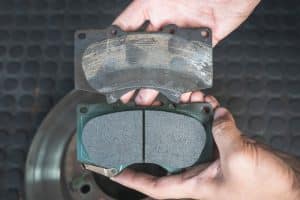
Signs Your Brake Pads May Be Worn
Brake pads usually give you some early warning signs before they become dangerously thin. Catching those signs early can make all the difference.
Here’s what to listen for and watch out for:
- Brake warning light
If your car has brake pad sensors, you might see a dashboard warning light when the pads are nearly worn. This is a direct alert, and it’s not something to ignore.
- Screeching or squealing sounds
Many brake pads include a wear indicator: a small metal tab that emits a high-pitched sound when the pad material gets too low. That noise is there for a reason. It’s telling you to take action.
- Grinding when braking
A grinding sound may indicate that the friction material is completely worn away. If the metal backing plate is contacting the disc, braking will be compromised and damage to other components is likely.
Not every issue with your brakes makes a noise. If something feels off, such as longer stopping distances or a change in pedal response, it’s best to get your braking system checked.
At JDK Automotive in Camberley, we’ll carry out a full inspection and give you a clear explanation of what’s going on. Whether it’s time to replace your pads or just monitor wear, we’ll make sure you’re informed and safe.
Why Brake Pad Replacement Shouldn’t Be Put Off
A brake warning light or odd sound might seem like something you can deal with later. But when it comes to brake pads, putting it off can lead to bigger problems — and higher repair costs.
Brake pads are designed to wear down gradually. But once they near the end of their life, the remaining material can disappear faster than expected. When that happens, the metal backing plate is exposed, and it begins pressing directly against the brake disc.
At that stage, you’re no longer just replacing brake pads. You may also need new discs, which makes the repair far more expensive than it needed to be.
There’s also the safety risk. Worn pads reduce stopping efficiency and increase the load on the rest of your braking system. Left too long, this can damage the callipers, overheat the brake fluid, or cause uneven braking when you need to stop quickly.
At JDK Automotive in Camberley, we’ve seen cases where a routine brake pad change became a much bigger job, simply because it was delayed. If you’ve noticed any signs of wear, or it’s been a while since your last brake check, now’s the time to get it looked at. A quick inspection could save you money and keep you safer on the road.
Why JDK Automotive is the Right Choice for Brake Pad Care
Brake pads might be small, but their importance couldn’t be greater. They’re essential to your vehicle’s ability to stop safely, which is why they should always be checked and replaced by a garage you can trust.
At JDK Automotive, we specialise in high-quality brake pad replacement and servicing. We use only OEM-approved or manufacturer-specified parts, and every job is completed to the highest technical standard. You get the same level of precision you’d expect from a main dealer, without the dealership price tag.
We support drivers across Camberley, Farnborough, and the surrounding area. You can expect expert advice, clear communication, and no unnecessary work. Just honest care for your vehicle from a team that knows what it’s doing.
Book Your Brake Pad Check with JDK Automotive
Noticed screeching, warning lights, or changes in braking? Don’t wait until it becomes a bigger problem. Brake pads are safety-critical components, and replacing them early can save you from much higher costs later.
We have a {{average-rating}} star Google rating from {{review-count}} satisfied customers, and we’re proud to be a trusted name across Camberley and Farnborough.
Call 01276 535585 today to book your brake pad check with JDK Automotive.
